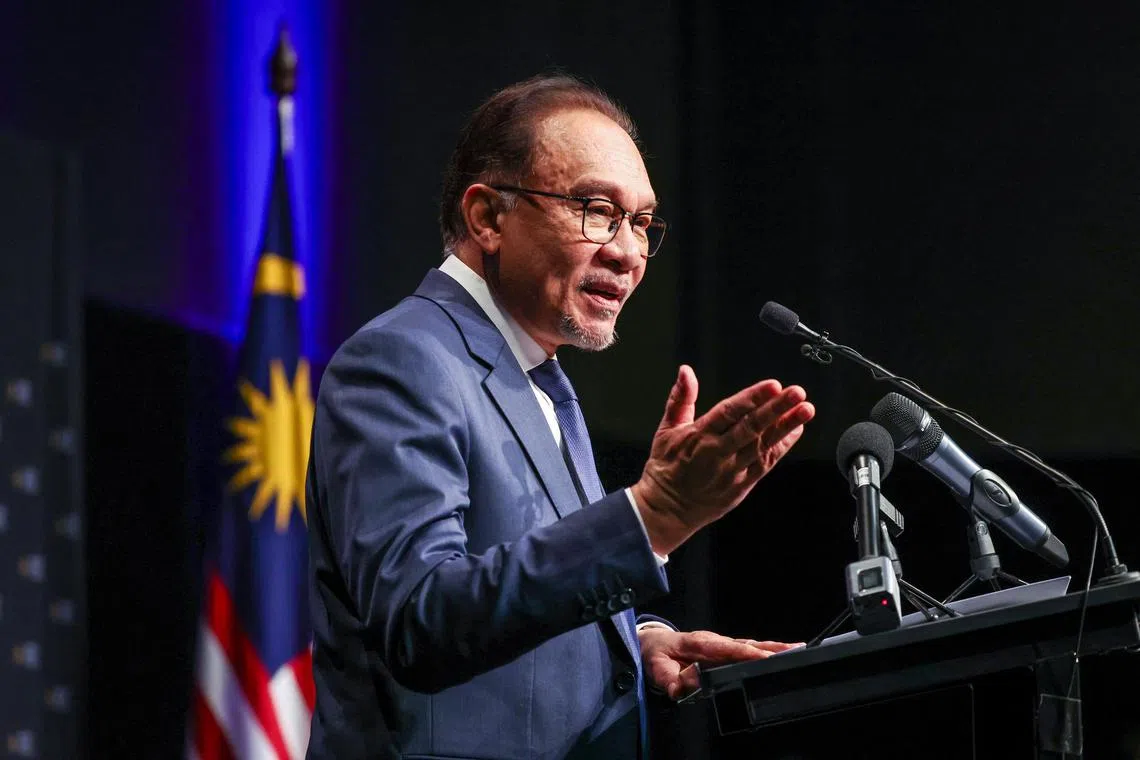Malaysia govt backs down after MPs and civil society condemn planned citizenship law changes
Sign up now: Get insights on the biggest stories in Malaysia

PM Anwar Ibrahim's Cabinet stepped back after deep misgivings were heard from PH's own MPs on part of the proposed amendments to the citizenship Bill.
PHOTO: AFP
KUALA LUMPUR - Malaysia has dumped plans for controversial changes to its citizenship laws
Home Minister Saifuddin Nasution Ismail told a press conference after the Cabinet met on March 22 that the conferment of citizenship rights by operation of law to foundlings and abandoned children, and the safeguarding of a citizenship pathway for vulnerable children – those born out of wedlock and adopted stateless children – would not be removed.
But he said that other constitutional amendments that were criticised would be retained. These involved removing automatic citizenship for children of permanent residents born in the country, lowering the age limit of childhood citizenship applications from 21 to 18, and depriving foreign wives of citizenship if the marriage is dissolved within two years of them becoming Malaysian.
The announcement confirms The Straits Times’ March 16 report
The proposed changes were part of a package that included one widely lauded constitutional amendment that would allow both mothers and fathers to pass on their Malaysian citizenship to their children born overseas.
Datuk Seri Saifuddin said: “After various engagement sessions with party whips, party heads, agencies, legal experts and other stakeholders, I have presented my input to the Cabinet. The Prime Minister has also held engagement sessions and we (the Cabinet) have agreed with the suggestions made.”
ST had learnt that a swathe of MPs from PH had expressed deep misgivings at briefings since Mr Saifuddin confirmed on March 8 that the Cabinet had given the green light for the Bill to be tabled in Parliament.
PH leads the multi-coalition government, and has long campaigned on a platform of progressive reforms. Its 2022 election manifesto made several pledges to reduce the problem of statelessness.
The proposal removing citizenship rights for stateless children born in Malaysia and foundlings by the “operation of law”, and instead requiring them to apply for citizenship from the Home Minister, had sparked furious backlash.
The MPs’ concerns revolve in particular around how abandoned children – especially if their parentage cannot be ascertained – would end up stateless, and be denied basic education and other rights enjoyed by citizens. The government has said 256 babies were abandoned between 2020 and 2022.
Constitutional amendments require a two-thirds supermajority – 148 in the 222-strong chamber – which Datuk Seri Anwar enjoys, thanks in part to six defectors from the opposition.
It is unclear whether rebel PH MPs – including a deputy minister who sources told ST had threatened to resign should the original Bill be passed – who were against the original Bill will now support it. The initial draft had also drawn rebukes from civil society and Malaysia’s Human Rights Commission.
The vice-chairman of the commission, Mr Ragunath Kesavan, on March 13 called the Bill “the most regressive proposed amendments in the last 50 to 60 years”, adding that statelessness “will perpetuate a cycle of poverty and may force them (those stateless) into a life of crime”.
“Amending the Federal Constitution to disenfranchise our children will not solve the underlying problem (of migration through porous borders),” said the Malaysian Citizenship Rights Alliance, an umbrella body of non-governmental organisations, before the March 22 Cabinet meeting.
Checks by ST had indicated that the majority of MPs from the Democratic Action Party, the largest outfit in government with 40 MPs, were in dissent, along with a significant number of the 31 MPs from Mr Anwar’s own Parti Keadilan Rakyat. Johor MP Hassan Karim openly stated he would not support the original Bill.
Others who had openly opposed the changes included former deputy law minister Ramkarpal Singh, who reminded Parliament on March 5 of Malaysia’s commitment to the United Nations to reduce statelessness, which would be harder to fulfil under the amendments.
A failure to get two-thirds of the vote, or if some of PH’s 81 lawmakers go rogue even if the Bill gains backing from the opposition, would be a major blow to the Premier amid lingering concern about the stability of his government
Even withdrawing the Bill would have been a major climbdown, as Mr Anwar had, as recently as March 12, expressed confidence in its merits and passage.



